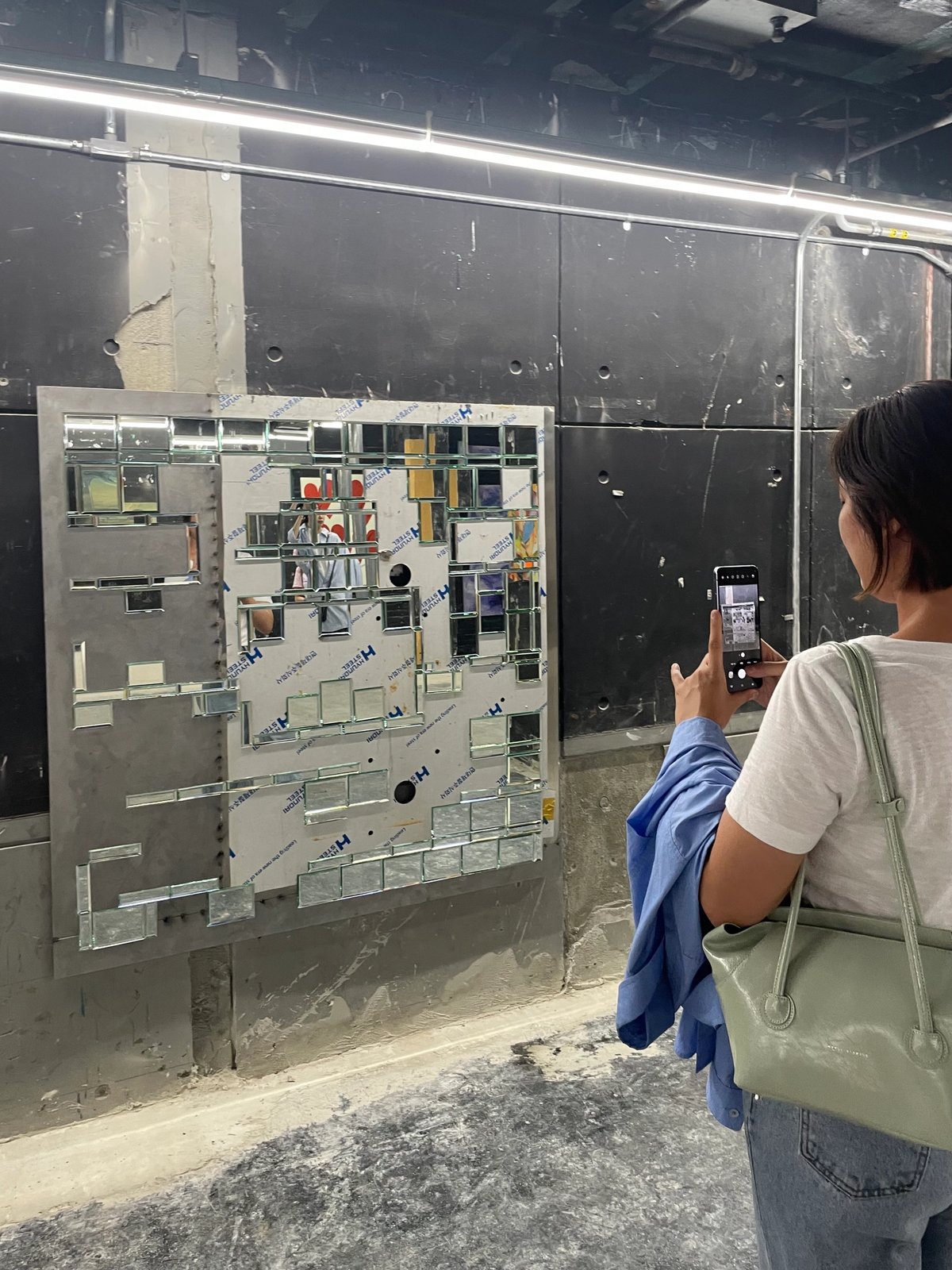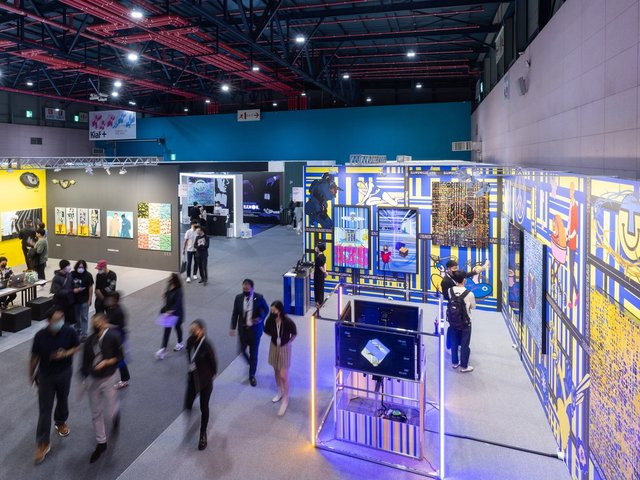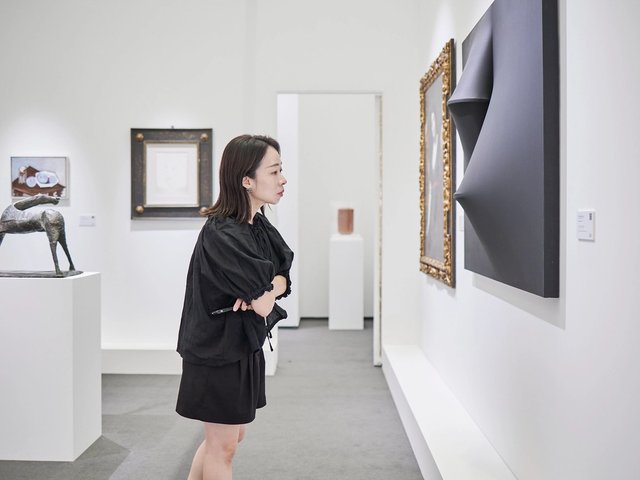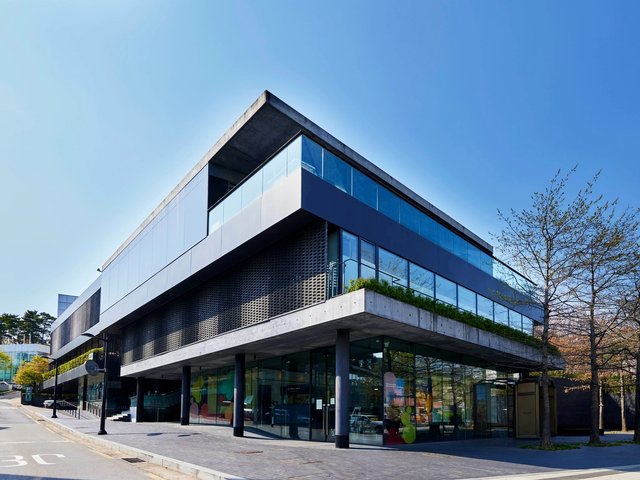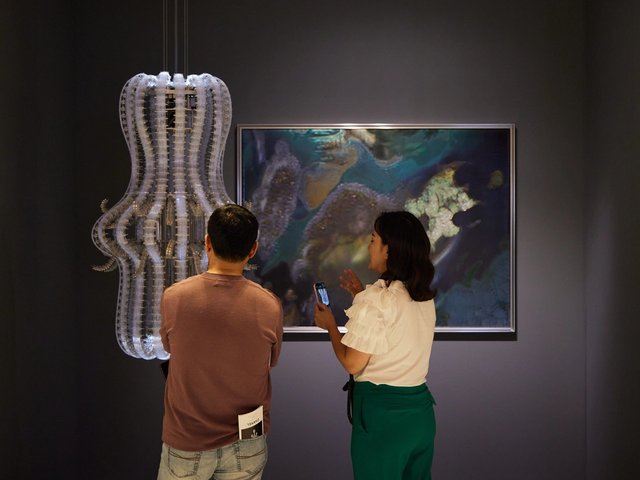Sweating at ‘Seoul Social Club’
The strength of an art fair week can not only be measured by its tentpole events, but the satellite ones too. And Seoul’s pull as a burgeoning art market capital is heightened by the launch of Our Week, a commercial exhibition (until 8 September) that brings together around 25 international galleries and local project spaces into a multi-storey bar and lounge in the city’s gaybourhood Itaewon. Rough concrete surfaces and exposed wiring set the scene for a free-flowing presentation of works from galleries such as Seoul’s Whistle and Commonwealth & Council from Los Angeles. In some cases, the run-down venue provides a smarter context for works than a white cube setting could. Case in point, Steve Bishop’s 2018 film, brought by Carlos/Ishikawa, that documents a groundskeeper's efforts to prevent a deserted city in Canada from falling into decay.
While plenty of works hit below or at the $5,000 mark, a handful will still pull at the pursestrings, including a sculpture by Chiharu Shiota priced above $60,000. “I wanted to stage a show that felt very borderless, with a broad range of works,” says Soo Choi, the co-founder of Our Week and director of P21 gallery in Seoul. She organises the event alongside Jungmin Cho, director of White Noise gallery and Sue Choi, co-founder of Cava Life creative agency.
Art fair circuit regulars might draw comparisons between Our Week and the second edition of Basel Social Club, which this June took over a vast former mayonnaise factory in the Swiss city’s north—and they’d be right to. “We were inspired to do this after visiting Basel Social Club,” Choi says. “We spoke to [one of Basel Social Club’s founders, the Paris gallerist] Robbie Fitzpatrick for advice. We needed something free-form and with a no-rules feel. It made sense to bring this to Seoul.”
Happenings and performances take place every day at Our Week throughout the four-day run time. These are book-ended by two parties, the first of which saw sweltering temperatures (guests were seen convening around the few strategically placed air conditioners) and revellers spill out onto the sloped streets of Itaewon. Choi says that the closing night will be a “semi-improvised, guerrilla event”. Get ready to sweat.

Teo Yang's hanok in Seoul
At home with Teo Yang
The prominent interior designer Teo Yang has opened up his two adjoining traditional Korean houses, or hanoks, to the public for this week to stage a selling exhibition (until 8 September; booking necessary) of works by 19th- and 20th-century masters and market darlings like Warhol and Morandi. Organised by the adviser-curator Lawrence van Hagen, the show sees blue-chip Western pieces placed in Yang’s exquisitely furnished home full of centuries-old Korean ceramics and Modernist dining chairs by Pierre Jeanneret, to provide “a blend of traditional and contemporary aesthetics that Teo is widely known for, and which is highly aspirational to a generation of Koreans,” Van Hagen says. He adds that the works on show are priced between $100,000 and $2.75m—the general range with which he finds the most success in Seoul.
Yang was recently announced as the director of the new Seoul art and design fair Define, launching in November. The designer is tight-lipped about his vision, but if his home is anything to go by, we can expect “expensive” and “chic”—as in, “1980s Richter hanging in the ceremonial tea room chic”.
Eagle-eyed visitors will also get a peek of Yang’s turtle, who was spotted beating the Seoul late-summer heat by cooling off in a mini stone pool. And just like that, next year’s designer pet trend was born.

Left: BTS's RM at the Bottega Veneta Leeum Museum event on 5 Setember. Right: part of Yeon Sang-Ho's 2023 installation at Prada Double Club, Seoul
Fashion brands out in full force for Frieze
Few places know the power of the luxury brand partnership like Seoul, a Chanel-clad city where every major fashion house has erected a starchitect-designed flagship store. This year, Frieze and Kiaf coincide with Seoul fashion week, and accordingly, the big designers are out in full force, hosting exhibitions, talks, and of course, parties. Perhaps the most intriguing art-fashion collaboration has come courtesy of Prada, which transformed an old cinema in the Samcheong-dong neighbourhood into an exhibition venue-cum-social club-cum-restaurant. This includes an installation by Yeon Sang-Ho, that stages a crime scene in a gristly motel hallway. In a blindingly lit room at the end of the corridor crouches an emaciated figure meant to depict the burnt corpse of a fictional character from the Netflix series "Hellbound" (although we interpreted it as a haunting premonition of our internal states following four nights of jet-lagged party hopping).
Meanwhile, Bottega Veneta took over the Leeum Museum, owned by the Samsung family, for two nights of festivities. Despite a celebrity appearance from BTS's RM (wearing a pair of Bottega's new season Fireman boots), guests were overheard complaining of the “dull vibe”, before grabbing a gift bag and heading to one of the dozens of dive bars a short walk away. They all seem to have forgotten the golden rule of art fair week parties—the more brand sponsorships on the bottom of the invite, the worse it will be. We’ll take a cheap karaoke bar and a bottle of Makgeoli over champagne and stilted conversation anyday.


